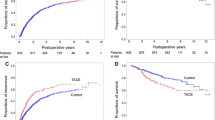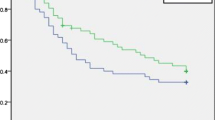Abstract
Purpose
Transcatheter arterial chemoembolization (TACE) is the treatment of choice for intermediate-stage hepatocellular carcinoma (HCC). The absence of an early response to TACE might indicate alternative therapeutic strategies early in the course of the disease, thus improving outcomes. Therefore, our purpose was to identify the relationship between treatment response after two sessions of TACE and the time to the development of extrahepatic metastasis and overall survival.
Methods
In total, 108 treatment-naïve intermediate-stage HCC patients who received at least two consecutive sessions of TACE as the first-line treatment were analyzed.
Results
The median follow-up duration was 28.5 months. Extrahepatic metastasis developed in 32 patients (29.6%). Patient age >60 years (P = 0.027), alpha-fetoprotein (AFP) >200 ng/ml (P = 0.039), and objective response after two TACE treatments (P = 0.001) were the predictive factors for time to the development of metastasis. The median survival time for the patients who achieved objective response after two sessions of TACE was 45.9 and 14.4 months for the patients who failed to achieve objective response (P = 0.0001). Objective response after two TACE treatments (P = 0.0001) and the occurrence of extrahepatic metastasis (P = 0.002) were associated with overall survival.
Conclusions
Early objective tumor response after two sessions of TACE was associated with prolonged time to metastasis and improved survival. Therefore, surveillance for metastasis should be performed more frequently when an objective response is not obtained after two sessions of TACE and in younger intermediate-stage HCC patients with high AFP levels.


Similar content being viewed by others
References
Waly Raphael S, Yangde Z, Yuxiang C (2012) Hepatocellular carcinoma: focus on different aspects of management. ISRN Oncol 2012:421673
Huang J, Yan L, Cheng Z, Wu H, Du L, Wang J et al (2010) A randomized trial comparing radiofrequency ablation and surgical resection for HCC conforming to the Milan criteria. Ann Surg 252(6):903–912
Bhangui P, Vibert E, Majno P, Salloum C, Andreani P, Zocrato J et al (2011) Intention-to-treat analysis of liver transplantation for hepatocellular carcinoma: living versus deceased donor transplantation. Hepatology (Baltimore, MD) 53(5):1570–1579
Sala M, Llovet JM, Vilana R, Bianchi L, Sole M, Ayuso C et al (2004) Initial response to percutaneous ablation predicts survival in patients with hepatocellular carcinoma. Hepatology (Baltimore, MD) 40(6):1352–1360
Llovet JM, Real MI, Montana X, Planas R, Coll S, Aponte J et al (2002) Arterial embolisation or chemoembolisation versus symptomatic treatment in patients with unresectable hepatocellular carcinoma: a randomised controlled trial. Lancet (London, England) 359(9319):1734–1739
Lo CM, Ngan H, Tso WK, Liu CL, Lam CM, Poon RT et al (2002) Randomized controlled trial of transarterial lipiodol chemoembolization for unresectable hepatocellular carcinoma. Hepatology (Baltimore, MD) 35(5):1164–1171
Llovet JM, Bruix J (2003) Systematic review of randomized trials for unresectable hepatocellular carcinoma: chemoembolization improves survival. Hepatology (Baltimore, MD) 37(2):429–442
Park JW, Chen M, Colombo M, Roberts LR, Schwartz M, Chen PJ et al (2015) Global patterns of hepatocellular carcinoma management from diagnosis to death: the BRIDGE study. Liver Int 35(9):2155–2166
Vesselle G, Quirier-Leleu C, Velasco S, Charier F, Silvain C, Boucebci S et al (2015) Predictive factors for complete response of chemoembolization with drug-eluting beads (DEB-TACE) for hepatocellular carcinoma. Eur Radiol 26(6):1640–1648
Barman PM, Sharma P, Krishnamurthy V, Willatt J, McCurdy H, Moseley RH et al (2014) Predictors of mortality in patients with hepatocellular carcinoma undergoing transarterial chemoembolization. Dig Dis Sci 59(11):2821–2825
Si MS, Amersi F, Golish SR, Ortiz JA, Zaky J, Finklestein D et al (2003) Prevalence of metastases in hepatocellular carcinoma: risk factors and impact on survival. Am Surg 69(10):879–885
Lencioni R, Llovet JM (2010) Modified RECIST (mRECIST) assessment for hepatocellular carcinoma. Semin Liver Dis 30(1):52–60
Kim DY, Ryu HJ, Choi JY, Park JY, Lee DY, Kim BK et al (2012) Radiological response predicts survival following transarterial chemoembolisation in patients with unresectable hepatocellular carcinoma. Aliment Pharmacol Ther 35(11):1343–1350
Gillmore R, Stuart S, Kirkwood A, Hameeduddin A, Woodward N, Burroughs AK et al (2011) EASL and mRECIST responses are independent prognostic factors for survival in hepatocellular cancer patients treated with transarterial embolization. J Hepatol 55(6):1309–1316
Kim BK, Kim SU, Kim KA, Chung YE, Kim MJ, Park MS et al (2015) Complete response at first chemoembolization is still the most robust predictor for favorable outcome in hepatocellular carcinoma. J Hepatol 62(6):1304–1310
Georgiades C, Geschwind JF, Harrison N, Hines-Peralta A, Liapi E, Hong K et al (2012) Lack of response after initial chemoembolization for hepatocellular carcinoma: does it predict failure of subsequent treatment? Radiology 265(1):115–123
Kim HY, Park JW, Joo J, Jung SJ, An S, Woo SM et al (2012) Severity and timing of progression predict refractoriness to transarterial chemoembolization in hepatocellular carcinoma. J Gastroenterol Hepatol 27(6):1051–1056
Pang RW, Joh JW, Johnson PJ, Monden M, Pawlik TM, Poon RT (2008) Biology of hepatocellular carcinoma. Ann Surg Oncol 15(4):962–971
Shyamala K, Girish HC, Murgod S (2014) Risk of tumor cell seeding through biopsy and aspiration cytology. J Int Soc Prev Community Dent 4(1):5–11
Senthilnathan S, Memon K, Lewandowski RJ, Kulik L, Mulcahy MF, Riaz A et al (2012) Extrahepatic metastases occur in a minority of hepatocellular carcinoma patients treated with locoregional therapies: analyzing patterns of progression in 285 patients. Hepatology (Baltimore, MD) 55(5):1432–1442
Arizumi T, Ueshima K, Minami T, Kono M, Chishina H, Takita M et al (2015) Effectiveness of sorafenib in patients with transcatheter arterial chemoembolization (TACE) refractory and intermediate-stage hepatocellular carcinoma. Liver Cancer 4(4):253–262
do Song S, Choi JY, Yoo SH, Kim HY, Song MJ, Bae SH et al (2013) DC bead transarterial chemoembolization is effective in hepatocellular carcinoma refractory to conventional transarteral chemoembolization: a pilot study. Gut Liver 7(1):89–95
Woo HY, Heo J (2015) Transarterial chemoembolization using drug eluting beads for the treatment of hepatocellular carcinoma: now and future. Clin Mol Hepatol 21(4):344–348
El Fouly A, Ertle J, El Dorry A, Shaker MK, Dechene A, Abdella H et al (2015) In intermediate stage hepatocellular carcinoma: radioembolization with yttrium 90 or chemoembolization? Liver Int 35(2):627–635
Kim Y, do Park BJ, Kim YH, Han KH, Cho SB, Cho KR et al (2015) Radioembolization with yttrium-90 resin microspheres in hepatocellular carcinoma: a multicenter prospective study. Am J Clin Oncol 38(5):495–501
Golfieri R, Bilbao JI, Carpanese L, Cianni R, Gasparini D, Ezziddin S et al (2013) Comparison of the survival and tolerability of radioembolization in elderly vs. younger patients with unresectable hepatocellular carcinoma. J Hepatol 59(4):753–761
Zhang L, Hu P, Chen X, Bie P (2014) Transarterial chemoembolization (TACE) plus sorafenib versus TACE for intermediate or advanced stage hepatocellular carcinoma: a meta-analysis. PLoS ONE 9(6):e100305
Shim SJ, Seong J, Han KH, Chon CY, Suh CO, Lee JT (2005) Local radiotherapy as a complement to incomplete transcatheter arterial chemoembolization in locally advanced hepatocellular carcinoma. Liver Int 25(6):1189–1196
Rossi S, Garbagnati F, Lencioni R, Allgaier HP, Marchiano A, Fornari F et al (2000) Percutaneous radio-frequency thermal ablation of nonresectable hepatocellular carcinoma after occlusion of tumor blood supply. Radiology 217(1):119–126
Author information
Authors and Affiliations
Corresponding author
Ethics declarations
Conflict of interest
None.
Ethical approval
This clinical study was performed in accordance with the Declaration of Helsinki and approved by the institutional review board of the Catholic University of Korea (Reference No. KC13RISI0152).
Rights and permissions
About this article
Cite this article
Lee, S.W., Lee, H.L., Han, N.I. et al. Early treatment response to transcatheter arterial chemoembolization is associated with time to the development of extrahepatic metastasis and overall survival in intermediate-stage hepatocellular carcinoma. Cancer Chemother Pharmacol 79, 81–88 (2017). https://doi.org/10.1007/s00280-016-3202-8
Received:
Accepted:
Published:
Issue Date:
DOI: https://doi.org/10.1007/s00280-016-3202-8




